Introduction
The Mediterranean diet has emerged as a beacon of health, celebrated not only for its delicious flavors but also for its profound impact on overall well-being. This dietary approach, characterized by an abundance of fruits, vegetables, whole grains, and healthy fats, has been linked to various health benefits, including:
- Improved heart health
- Reduced risk of Type 2 diabetes
- Enhanced gut health
Furthermore, recent research highlights its potential in promoting cognitive function and longevity. As individuals increasingly seek effective ways to improve their health, understanding the diverse advantages of the Mediterranean diet becomes essential. This article delves into the multifaceted benefits of this dietary pattern, offering insights and practical tips for those looking to embrace a lifestyle that prioritizes health and wellness.
1. Heart Health: The Mediterranean Diet's Impact on Cardiovascular Disease
Renowned for its rich profile of heart-healthy fats, the Mediterranean diet primarily derives these fats from sources such as olive oil, nuts, and fatty fish. Research has consistently shown that adherence to this dietary pattern correlates with a significantly reduced risk of developing cardiovascular diseases. In fact, three randomized clinical trials have demonstrated its primary and secondary preventive effects against cardiovascular diseases, reinforcing its status as a cornerstone of cardiac well-being.
The high consumption of fruits, vegetables, whole grains, and legumes plays a crucial role in lowering cholesterol levels and enhancing blood pressure regulation. Furthermore, the meal's moderate inclusion of red wine is associated with increased levels of high-density lipoprotein (HDL) cholesterol, which is especially advantageous for cardiovascular well-being. Recent research highlights that adhering to the Mediterranean diet can result in a reduction in the occurrence of heart attacks and strokes, establishing it as a vital nutritional option for individuals prioritizing cardiovascular health.
As mentioned by Jacques Delarue, 'This nutritional approach is not merely a regimen; it is a way of life that encourages enduring health advantages.' Additionally, as stated by Harvard researchers, new advantages of the region's eating habits continue to appear, further confirming its significance for individuals dedicated to preserving a healthy heart. The results of a recent assessment also endorse the 2019 Heart Foundation of Australia's suggestions for healthy eating patterns, incorporating elements of the Mediterranean diet, aimed at reducing cardiovascular disease risk, indicating a transition towards food-based recommendations in future nutritional guidelines.
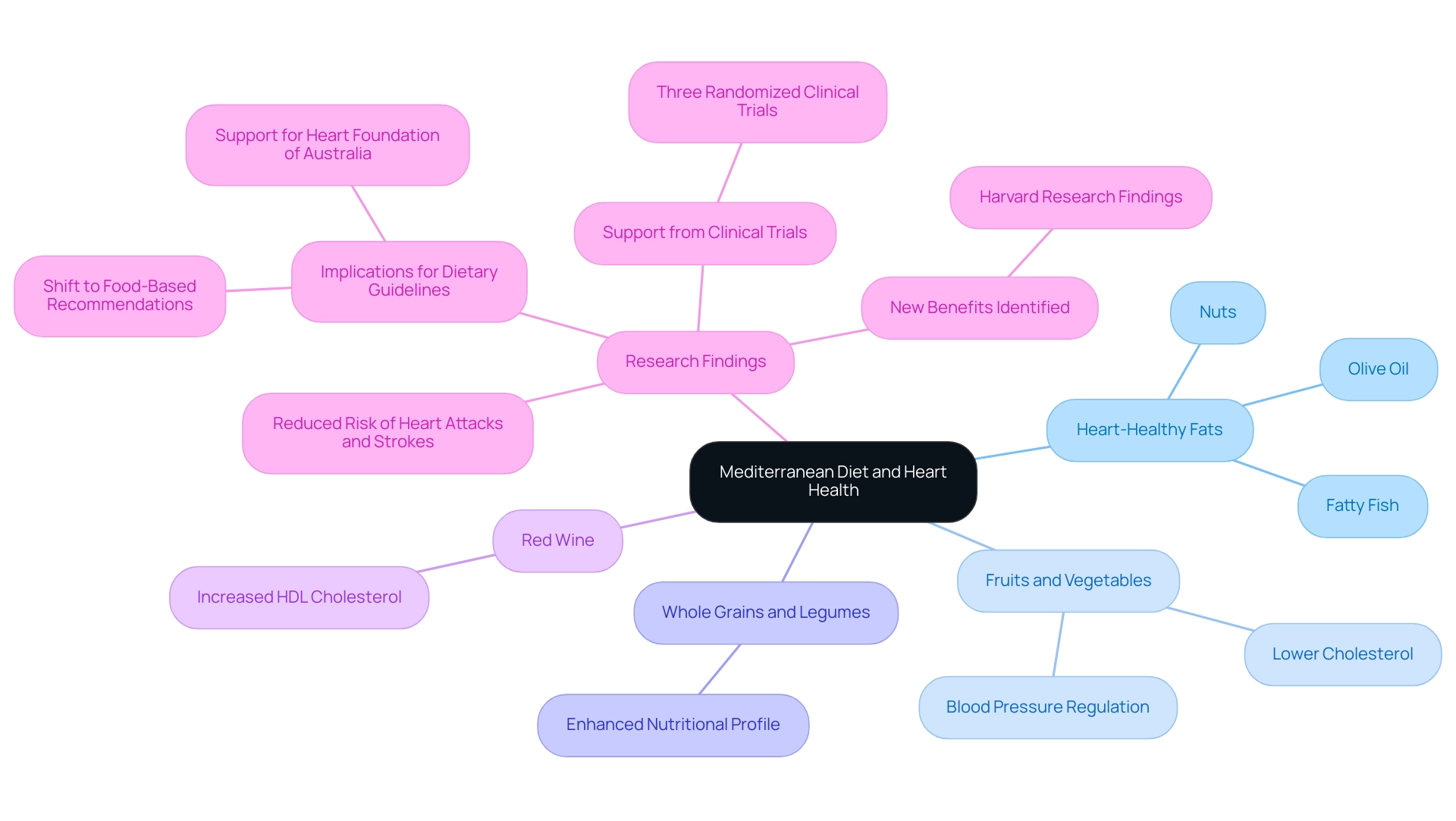
2. Diabetes Prevention: How the Mediterranean Diet Lowers Risk
The Mediterranean diet is acknowledged for its ability to greatly reduce the likelihood of developing Type 2 diabetes, mainly because of its emphasis on whole, unprocessed foods. This dietary approach is rich in dietary fiber sourced from an array of fruits, vegetables, and whole grains, all of which play a crucial role in regulating blood sugar levels and enhancing insulin sensitivity. In a randomized controlled study involving 27 participants, it was observed that HbA1c levels decreased from 7.1% to 6.8% (p = 0.021) after a 12-week adherence to the Mediterranean diet.
Furthermore, the incorporation of healthy fats—such as those found in olive oil—and lean proteins contributes to a balanced nutritional profile that supports overall metabolic health. Notably, the ATTICA study, which utilized multi-adjusted models to account for potential confounding factors, revealed that sustained high adherence to the Mediterranean diet is protective against Type 2 diabetes mellitus, demonstrating a significant reduction in incidence when compared to those with low adherence. The findings indicate that individuals who adopt this healthy eating pattern can proactively control their diabetes risk, making it a beneficial option for those worried about this chronic condition.
Recent news has also highlighted that the Mediterranean diet is associated with better glycaemic control and improved cardiovascular risk factors compared to control meal plans, reinforcing its suitability for managing Type 2 diabetes. As indicated in the research, women who followed a Mediterranean-style eating pattern were found to be 46% more likely to age well, emphasizing the eating plan's long-term wellness advantages. Experts stress that the high fiber consumption from the Mediterranean diet is essential for diabetes prevention, further endorsing its adoption.
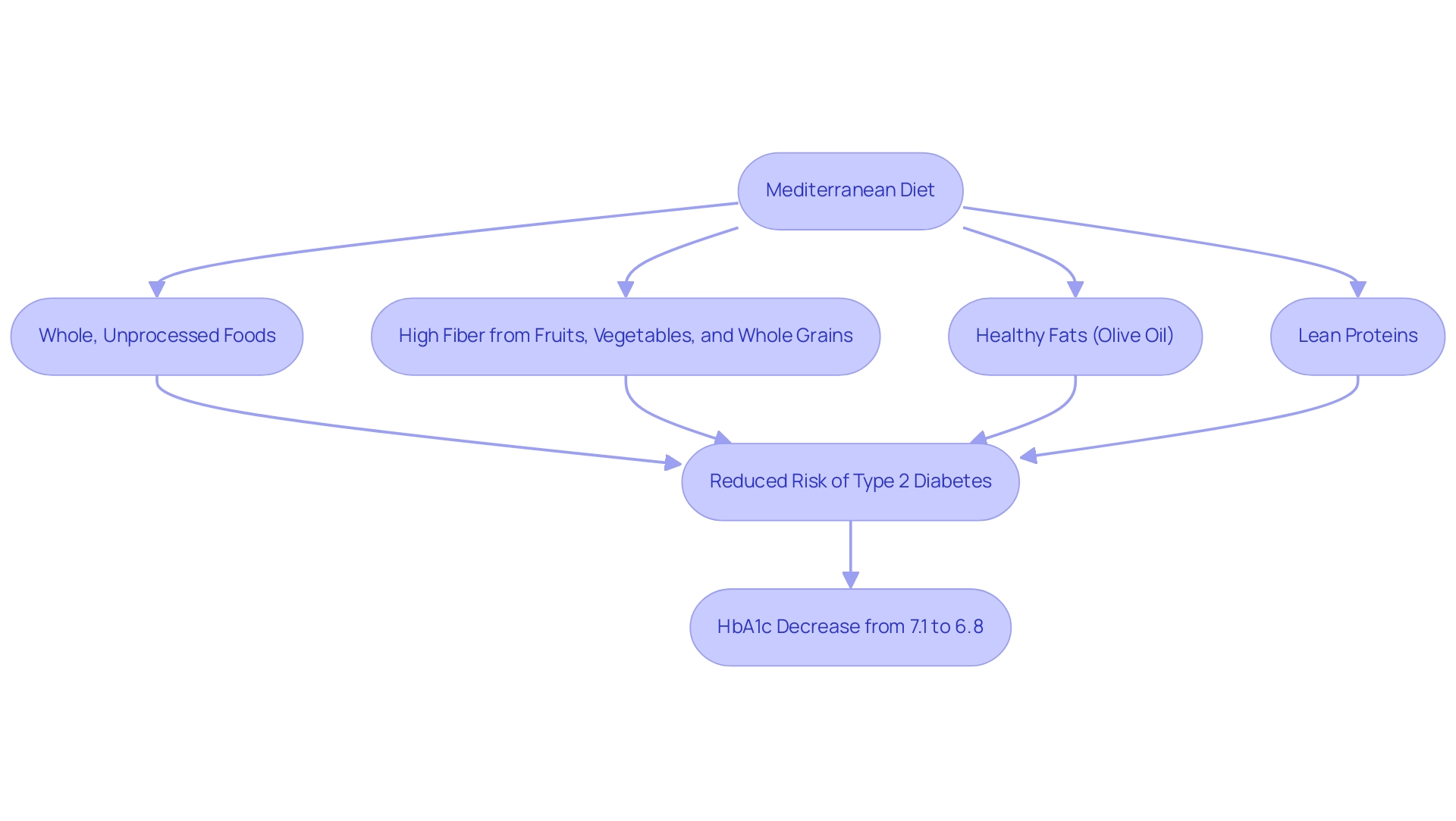
3. Gut Health: The Mediterranean Diet's Role in Digestive Wellness
The culinary practices of that region are famous for their capacity to improve gut health, mainly because of their abundant fiber content. Foods such as whole grains, fruits, and vegetables are integral components, effectively supporting the proliferation of beneficial gut bacteria. Recent studies indicate that this dietary pattern is associated with a significantly reduced risk of developing inflammatory bowel disease (IBD), with research showing that individuals following this regimen have up to a 30% lower risk of IBD compared to those who do not.
This suggests it acts as a protective factor against such conditions. Furthermore, the inclusion of fermented foods like yogurt and olives not only contributes to a diverse microbiome but also plays a crucial role in digestive wellness. Priyanjana Pramanik emphasizes that the Mediterranean diet is associated with enhanced gut diversity, which is crucial for optimal digestion, immune function, and even mood regulation.
Recent bioinformatics analyses, utilizing the USEARCH v11.1 tool, have confirmed the positive impact of fiber-rich foods on the gut microbiome, indicating that these foods significantly enhance microbial diversity and abundance. This strengthens the notion that embracing the Mediterranean diet can result in significant enhancements in digestive well-being. As individuals adopt this nutritional strategy, they not only promote their digestive wellness but also improve their overall well-being.
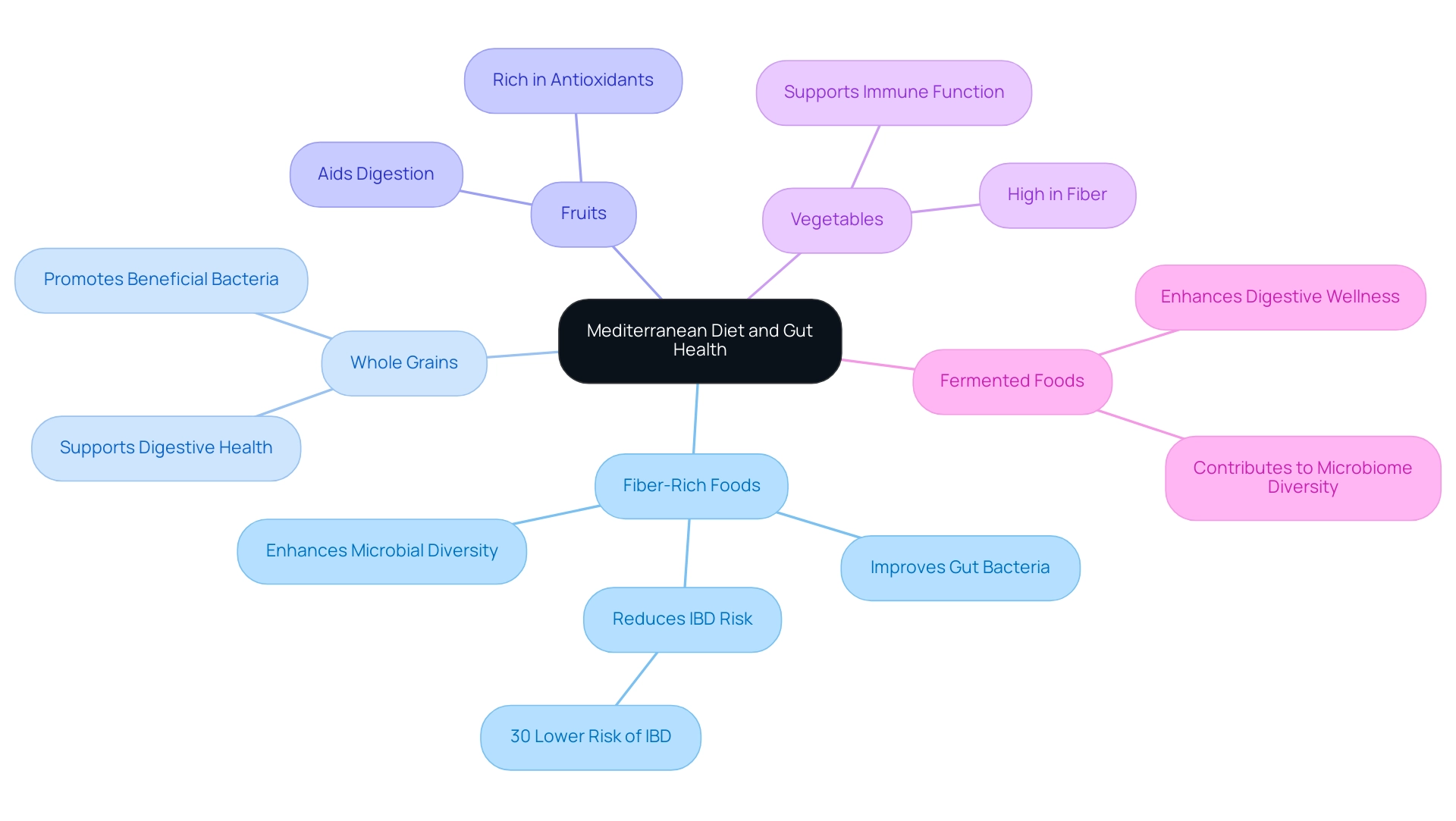
4. Beyond the Basics: Additional Health Benefits of the Mediterranean Diet
Beyond its well-documented benefits for cardiovascular wellness and diabetes prevention, the Mediterranean diet is associated with a multitude of extra advantages, especially concerning cognitive function. Recent research has indicated a compelling link between adherence to the Mediterranean diet and a reduced risk of Alzheimer's disease and dementia.
A study conducted by Cornelis MC et al. (2022) highlights the importance of eating habits such as the Mediterranean-style eating plan in enhancing cognitive health, especially through its link with the MIND eating pattern, which has demonstrated considerable advantages for cognition and a reduced occurrence of dementia.
The statistics show a combined odds ratio (OR) of:
- 0.91 for cross-sectional studies
- 0.84 for cohort studies
indicating a strong relationship between the Mediterranean diet and cognitive function. The Mediterranean diet, which includes staples such as olive oil, nuts, and fatty fish, has anti-inflammatory properties that play a significant role in lowering systemic inflammation, closely tied to various chronic diseases.
Additionally, the Mediterranean diet promotes a lifestyle that encourages social eating and physical activity, both vital for mental well-being. Incorporating the Mediterranean diet into these lifestyle elements not only enhances the enjoyment of meals but also promotes healthier living overall, contributing to improved cognitive function and mental resilience. Furthermore, we express our gratitude to Prof. David Groneberg and the Institute for Occupational, Social, and Environmental Medicine at Goethe University in Frankfurt a.M. for generously providing the facilities necessary for the exercise training program for the German participants.
Acknowledgments to esteemed institutions in the UAE and Saudi Arabia emphasize the collaborative effort in enhancing our comprehension of the advantages of the Mediterranean diet, further reinforcing its reputation as a cornerstone of holistic health.
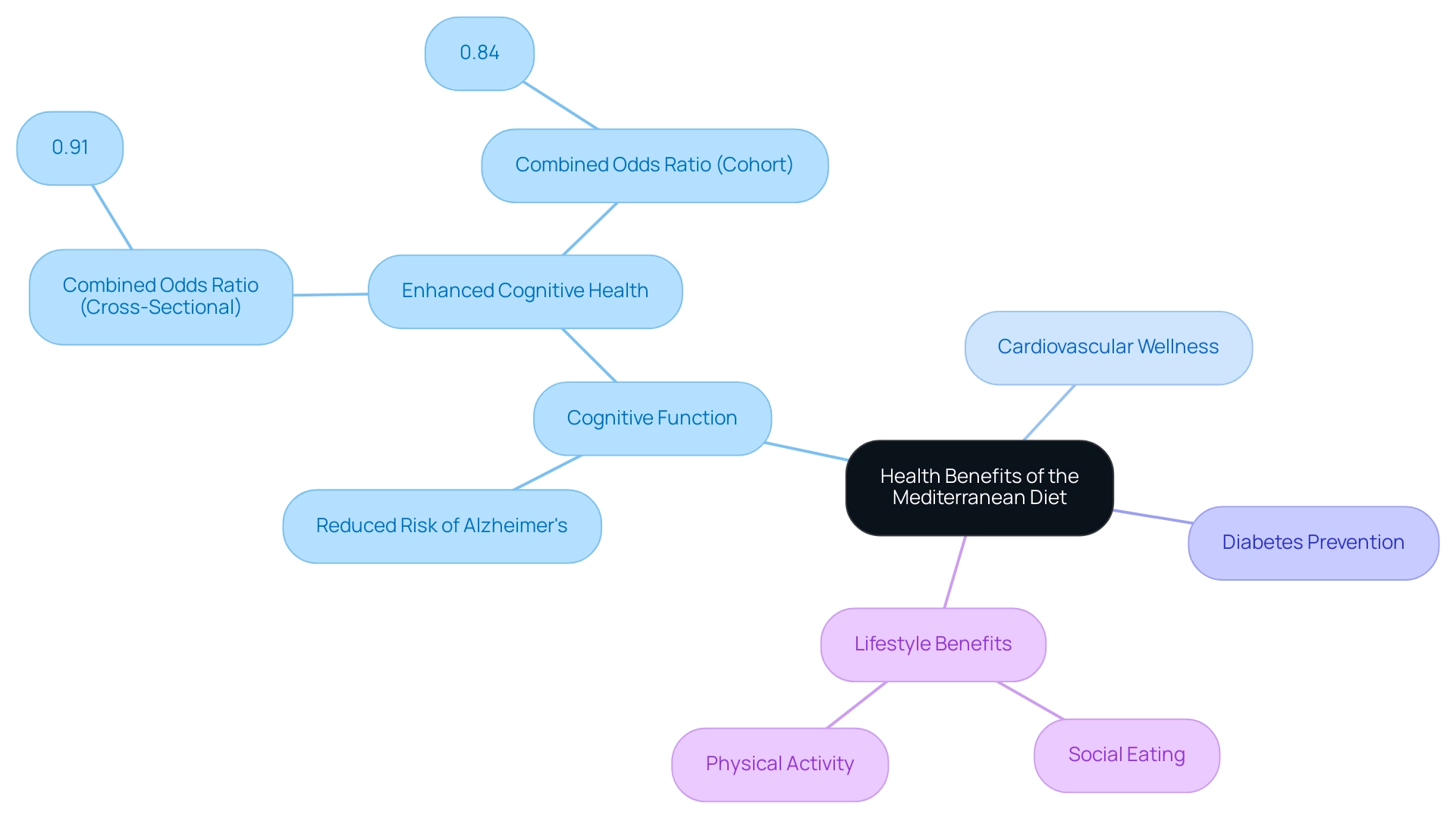
5. Practical Tips for Embracing the Mediterranean Lifestyle
Embracing a coastal lifestyle can be achieved through several straightforward strategies. One of the key recommendations is to incorporate at least five servings of fruits and vegetables into your daily meals, as these are foundational components of nutrition. Whole grains should be prioritized over refined grains; for instance, choosing brown rice or whole-grain bread enhances nutritional value.
Healthy fats, particularly olive oil, should be included in cooking and salad dressings, serving not only as a flavorful addition but also as a heart-healthy choice. Fish is encouraged as the primary source of protein, with a target of at least two servings per week. Furthermore, effective meal preparation and planning are essential to ensure that nutritious options are readily available, simplifying adherence to the Mediterranean diet.
Recent studies have shown that those who follow the Mediterranean diet experience benefits such as healthier aging, with adherence linked to longer telomere length and a 46% increased likelihood of aging healthfully. Radd-Vagenas et al. describe meal patterns and food components similar to those described by Kafatos et al. and Trichopoulou et al., emphasizing the importance of these food choices. Interestingly, while Japanese dietary patterns showed some benefits akin to the Mediterranean diet, adherence to the Mediterranean diet was associated with maintaining muscle strength, offering a comparative perspective on dietary benefits.
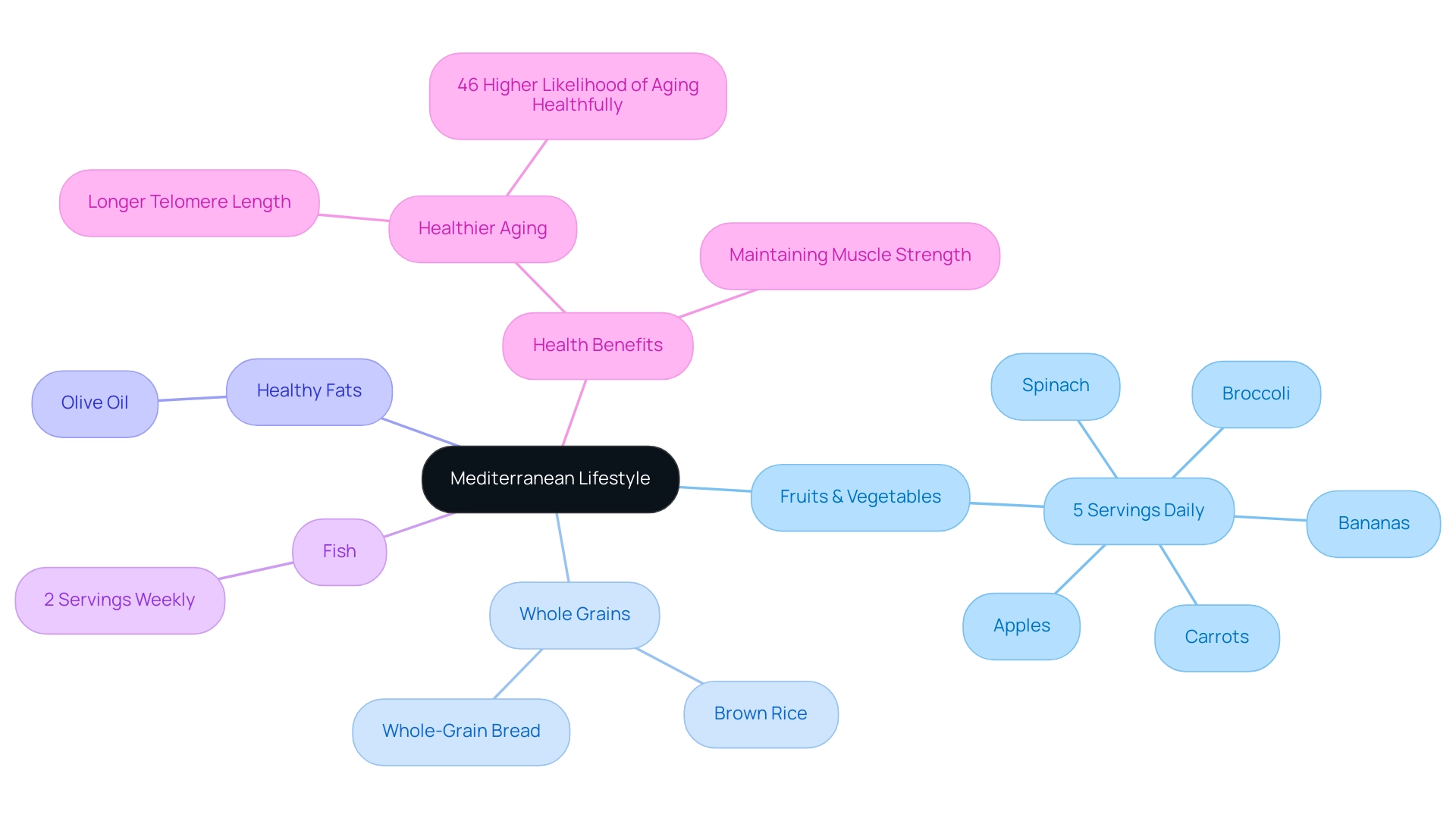
Conclusion
Embracing the Mediterranean diet offers a multitude of health benefits that extend well beyond mere weight management. This dietary pattern, characterized by an abundance of fruits, vegetables, whole grains, and healthy fats, is particularly effective in promoting heart health, significantly reducing the risk of cardiovascular diseases. Research has consistently highlighted its protective effects against heart-related issues, making it a fundamental choice for those focused on maintaining cardiovascular wellness.
Moreover, the Mediterranean diet plays a crucial role in diabetes prevention, largely due to its emphasis on whole, unprocessed foods that help regulate blood sugar levels and enhance insulin sensitivity. Studies indicate that individuals who adhere to this diet can positively influence their diabetes risk, showcasing its importance in managing chronic conditions.
In addition to these benefits, the Mediterranean diet supports gut health by fostering a diverse microbiome and reducing the risk of inflammatory bowel disease. The inclusion of fiber-rich foods and fermented options contributes to optimal digestive wellness and overall health.
Beyond physical health, recent research underscores the diet's potential in enhancing cognitive function and mental resilience. Its anti-inflammatory properties and lifestyle components promote not just better nutrition but also social interactions and physical activity, which are vital for mental well-being.
For those looking to adopt this lifestyle, practical strategies such as:
- Prioritizing fruits and vegetables
- Choosing whole grains
- Incorporating healthy fats
- Planning meals
can facilitate adherence to the Mediterranean diet. The evidence is clear: by embracing this holistic approach to eating, individuals can significantly improve their health outcomes, promote longevity, and enjoy a vibrant, fulfilling life.



















